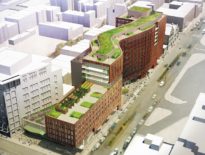
Boston’s biotech boom is leading to lots of big-ticket home sales. That same upward pressure on home prices could sour the region on the industry.
To read The Wall Street Journal, brokers in Boston are dancing in the streets as Moderna executives snap up multimillion-dollar condominiums and houses right and left in Greater Boston and on the Cape.
The dramatic expansion of the vaccine developer saw an influx of highly paid executives who snapped up luxury condos and homes in Boston and the suburbs, according to the WSJ’s recent, celebratory feature, which included interior shots of some of the deluxe new digs.
The sales director of the St. Regis Residences Boston, under construction in the Seaport, was “elated,” we are told, after a bidding war between a Moderna and Pfizer executive for a choice unit brought to an end “a long sales drought.”
Contrary to what the Journal’s editorial team might think, the Boston real estate market definitely doesn’t need any bailing out right now by cash-flush life science executives, especially when it come to the sale of luxury homes and condos.
In fact, the bigger issue here – and one not even hinted at in the WSJ piece – is not a dearth of demand for new condo units, luxury or otherwise, but rather a surfeit of it driven in part by an influx of highly paid employees from Moderna and other life science companies.
As it stands now, the rapidly growing life science sector is on a collision course in the Boston area with a housing market that is beyond tight.
And based on the backlash the tech industry has faced on the West Coast for helping drive up home prices and rents in the Bay Area and Seattle and other hot spots, things could get similarly ugly here unless steps are taken now to dramatically ramp up housing production.
Michael Procopio, CEO at Procopio Cos., put it well when talking to the Boston Globe last year: “If you can’t get the housing approved, you’ve got no place for this demand.”
Tip of the Iceberg
The Journal piece focuses on a handful of Moderna execs pulling down the kind of salaries needed to buy $5 million condos.
But that’s just the tip of the iceberg with the life science company, during its successful quest to develop a Covid vaccine, having expanded its payroll from 830 at the end of 2019 to more than 3,200 in 2022.
Not only that, but Moderna employees are very well-paid, with a median salary of $133,074. That’s a lot highly compensated scientists and researchers, marketers and lab technicians sourcing the neighborhoods and suburbs of Greater Boston for a place to buy or rent.
And that’s just one company, with dozens if not hundreds of life science companies well established across the Boston area right now.
The Boston area’s 28 million-square-foot lab market just spent the last two years undergoing a major expansion, with more than 11 million square feet of new research space under construction.
And another 40 million square feet of lab and other life science space is either in the proposal stage or had has lined up the local and state permits needed to go forward, according to Newmark research. While as much as 65 percent of that space may be delayed or cancelled amid growing financing challenges and other headwinds afflicting the life science sector, Newmark says, that still leaves and additional 14 million square feet ready to go in the next few years.
Tens of millions of square feet of lab space feet either already under construction or firmly on the drawing boards means thousands if not tens of thousands of new jobs in a life science sector that already employs roughly 90,000 people in Massachusetts.
That’s a lot of people and a lot of money flooding into the housing market, putting further upward pressure on real estate values at a time when they are already at record highs – the median price for a single-family home in the Boston area recently hit a record $900,000.
All of which would be fine if new home, condo and apartment construction were rising in tandem with demand, but that is far from the case.
A Warning of a Likely Future
Construction of new housing – both single family and multifamily – hit new lows in the 2010s, continuing a decades-long decline.
The number of residential units built across the state hovering around 16,000 to 17,000 per year, less than half of what it was in the 1980s, when the state had a million fewer residents.
And the 2020s have seen more of the same, with the Boston area seeing a significant drop in permits for both new homes and new condos and apartments in the first five months of 2022, alone.

Scott Van Voorhis
The fact is, the local housing market hasn’t been able to keep up with demand now for decades, let alone the kind of supercharged demand being generated by the explosive growth of the life science sector.
Short of truly dramatic action by state legislative leaders and the next governor to substantially ramp up housing production, the life science sector could find that its reputation in Massachusetts as job creating, vital, even noble industry has a limited shelf life.
Instead, life science companies could wind up facing the kind of resentment and even street protests that tech giants in the Bay Area have been grappling with for several years.
Housing activists and others have pinned the blame for the dramatic escalation in home and condo prices and rents on the tech industry’s explosive growth, with major players like Apple now on the hook for adding housing when they want to expand their corporate campuses.
Don’t think it can happen here? Think again. The Bay State is not quite there yet, but the clock is quite definitely ticking.
Scott Van Voorhis is Banker & Tradesman’s columnist; opinions expressed are his own. He may be reached at sbvanvoorhis@hotmail.com.






